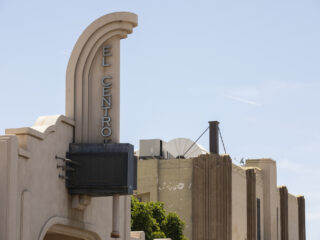by James A. Clapp
That the avid traveler is often an avid reader (and/or moviegoer) is frequently noted. It is an observation that surely applies to me. After my passport, tickets and travelers cheques have been have been diligently attached to my person, my thoughts turn to what I will be reading on my trip. The books can be history, biography, or fiction, but there is one requirement: they must be by or about some place or someone where I am traveling. There is nothing as incongruous, or ludicrous as someone reading a John Grisham novel at a cafe in Positano.
I had thought hard about what might be appropriate for a visit I would be making at the Black Sea port Constantsa, Rumania. I would be arriving by ship, and it would be nice to have read, or be reading something that would add some heightened level of interest and appreciation for the short time I would be there.
A few weeks prior to departure the “Constantsa book” was still an unfilled hole in my travel reading plans. It was a different interest that caused me to remove a dusty book from the shelf of my favorite used book store in San Diego. It was a novel of the exile of the Roman poet, Publius Ovidius Naso, popularly known as Ovid, and his exile to a garrison town in Roman colonized Dacia; a town called Tomi. I instinctively grabbed the book because in four years of studying Latin, my Jesuit teachers had assiduously avoided even an introduction to any of the Roman poets. Of Roman war I knew a great deal, having plodded with Caesar’s legions over most of the Roman world. But of Roman love I knew next to nothing. So it was Ovid’s name that caught my eye, he the author of the manual of seduction for Roman males, Ars Amatoria.
It was not until I had the book home, eager to feed my long-delayed highschool prurient interest in Roman erotica that I decided first to see if I could locate Tomi. The geographical dictionary said: Tomi, or Tomis, cf. Constantsa. Unwittingly I had found my “Constantsa book” and I resolved to start it somewhere in the Ukraine and “time” is completion for my arrival at Constantsa, or Tomi.
Ovid himself was a reluctant literary traveler. It was not his literary talents, but his subject matter, that got him exiled from Rome by Augustus in 8 AD. He would have much preferred to remain at the center of the Empire where the inspiration and audience for his work was large and enthusiastic, and where the supply of beautiful women was endless. “Playboy of the Roman World” is how one reviewer of several new translations and commentaries in the most recent Ovidian revival characterized him. For any Roman exile from the capitol was a capital sentence. For an urban rake to be banished to such a backwater as a garrison town in Dacia populated with soldiers, camp-followers, and pacified local illiterates, exile must have been a fate worse than death.
Indeed, present-day Tomi still has the gritty, derelict feel of a garrison town, although this may have more to do with the years of Ceausescus dictatorship rather than Ceasar’s. A pall of destitution hangs over the entire port. Forests of cranes, acres of them, signals its former importance as an entrept. But nothing is going on here; the cranes stand idle and rusting, as lifeless as trees in a forest murdered by acid rain. The only activity is some sluggish unloading from a rust-stained Shanghai freighter, its red smears looking like blood from the flanks of a harpooned whale. It’s a graveyard for a failed political-economy.
There is not much that Ovid might recognize in the present-day city. It has grown from the Roman castrum into a metropolis of a quarter million. The sweeping curve of beach fronting the Black Sea (called the Euxine in his day) on the road into town might be the same. It remains one of the Rumanian Black Sea resorts, but the hotels all look down-at-the-heels, and the beach is deserted. He would certainly recognize the large mosaic floor of the former baths, now preserved in an annex to the Archeological Museum. But what he would think of the statue of him that sits centered in the square in front of the museum can only be guessed. After all, there are blank pedestals where statues of Stalin and Lenin once stood.
Guessing, and inventing, are, of course, is what a novelist such as Horia must do about the poet’s years in exile there. He has the poet visit a city to the north of Tomi, Aegypsos, that took its name from far off Egypt. That city serves as the source of the origin of the wandering Gypsies, who refer to themselves as “Rom,” and, as a complaining American couple at the local tourist office attest with their razor-slit pockets and purse, are locally active in their skillful larceny. Aegypsos, for which Horia has Ovid employ the 2nd Century Greek traveler and geographer, Pausanias, as a Baedecker, lies at the top of the Danube delta, and may be the site of present-day Tulcea.
Despite the ancient place-names and personalities there is something remarkably contemporary about the circumstances that dictated Ovid’s fate. In the early years of the first century, Rome was enjoying a period of peace after years of war. Octavian, the adopted son of Julius Caesar, had vanquished Antony and Cleopatra at Actium, and declared himself Augustus. It was also a period in which the more conservative moral code that had come down from the days of Rome’s Republican and agrarian past had loosened considerably. Roman Patrician couples often divorced, abortion was not considered unacceptable, particularly as smaller, urban families were becoming the norm. Ovid could write openly and with approval of his own amorous escapades. He chronicled his long adulterous affair with a married woman who aborted his child, and whose maid was also one of his seductions.
The poet reveled in the sexual license of his times, even to mocking the “crudities of our ancestors” in maintaining monogamous relationships. “Those Sabine women stuck to / One husband apiece. But then they didnt wash.” he wrote.
But as has happened to artists in many ages Ovids proselytizing of his lifestyle through his verses ran afoul of shifts in the political zeitgeist. Augustus himself was anything but a model for what today would be referred to as “family values”. He was a bit of a playboy himself before he divorced his wife, Scribonia, to marry Livia even as she was carrying her divorced husband’s child. But dictators are often “do as I say, not as I do,” types, and then as nowadays, controlled the “spin” on public opinion. Augustus, out of reformist zeal, and by domination of the Senate, began to promulgate legislation that would have pleased the types of right-wing religious groups roiling the political waters in contemporary America. Among the laws was one that permitted the banishment of adulterers. Although such laws were not always enforced a high-profile personality like the author of the Arts of Love could make a good scapegoat or example.
Ovid certainly sensed the precariousness of his position. Perhaps to ingratiate himself with the Emperor he dedicated his lengthy poem, the Fasti, a celebration of Roman religious festivals to Augustus to convince him he had switched his love interest from the secular to the sacred. The ploy didn’t work and Augustus in return blamed his poetry for the licentiousness of his daughter Julia, and Ovid was packed off to Tomi.
According to Horia at first Ovid pined for Rome and its women, orgies, banquets and other pleasures, and for a time plotted ways to regain the good graces of Augustus. Even his amour with a beautiful Dacian woman only remind him of his Roman mistress.
But gradually he formed friendships with the locals, a tavern-keeper, and slave girl, and courtesan, and even a Roman centurion, and so too came to the realization that he would live out his years in this remote outpost. He even seems to have turned his interest to the early Christianity that appealed to the Dacians and may have appealed to him as he himself was subjected to or observed the rigors, dangers, and violent treatment of these remote Roman subjects.
And so Ovid marked his final years in exile, although there seems to be only the statue in the museum square to commemorate his tenure there. But, of course he comes to life through his poetry again and again, especially when the times are easy-going, the spirit of the times turn from war, to love. And when a literary traveler is looking for something to make a trip, even to an erstwhile place of exile, more memorable.
Notes
1 Better to be known by this name than “Naso,” meaning “nose,” an obvious invitation to ridicule.
2 Vintila Horia, God Was Born in Exile: Ovid at Tomi, (St. Martins Press, 1961)
3 Bernard Knox, “Playboy of the Roman World,” The New York Review of Books, January 15, 1998, Pp. 32-36
4 A subsequent book that centers its plot on Ovid’s exile at Tomi is Christophe Ransmayr’s The Last World (Grove Weidenfeld, 1988). Ransmayr places his story at Tomi after the death of Ovid where a youthful Roman admirer searches for the lost manuscript of the poet’s Metamorphoses, rumored to have been burned by the author in his depression over his banishment.
James A. Clapp is Professor of Urban Planning and Director of the Program for Media & Urban Affairs at San Diego State University.
More on the Web
The Ovid Project: Metamorphosing the Metamorphoses
A collection of illustrated works of Ovid.
Ovid: Metamorphoses
A list of Ovid links on the Web








